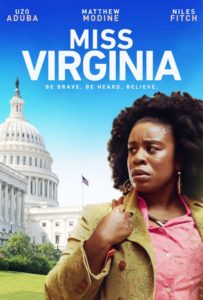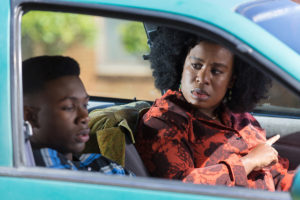Film Review: “Miss Virginia” Makes the Grade
Written by: Hannah Tran | October 18th, 2019

Miss Virginia (R.J. Daniel Hanna, 2019) 3 out of 4 stars.
I am no stranger to the failures of the public school system. I grew up in Nevada, the state consistently making the bottom of the lists for education. I am familiar with the anger felt toward these systems, the people behind their failures, and the reasons they are failing. R.J. Daniel Hanna’s debut film, about a mother trying to change the Washington D.C. school system so her son can afford a better education, is also familiar with this anger. Even more, it’s committed to solving this anger. The most impressive feat this movie accomplishes in its quest is that it makes you feel as though that may just be possible.
While Miss Virginia follows all the beats of your typical feel-good movie, the based-on-a-true-story aspect of the film manages to bring a rejuvenated energy to them. While the real Miss Virginia’s triumph is certainly not ancient history, this film does a good job of making her situation even more relevant to the 2019 viewer’s lens. It’s the sort of film the titular character would find inspiring, and this is felt through the absolutely magnetic performance of its lead, Orange Is the New Black phenom Uzo Aduba.
Not only is Miss Virginia herself given justice beyond the kind found in the courtroom, but the supporting characters, as well, are just as perfectly cast. Matthew Modine as Congressman Cliff Williams notably brings an ever-watchable frenetic sort of energy to his role that is hard not to be entranced by. Furthermore, Niles Fitch as her son is a perfect match for Aduba’s empathetic and expressive attitude.

Although it may suffer a little from a categorically cheesy soundtrack and some distracting or over-stylized editing and shot choices, it never feels overly out of line with the narrative at hand. The only thing that did seem occasionally at odds with it was Miss Virginia’s relationship with her son. While the first and last sections of her story palpably explore their powerful love and her dedication to him, the second section misses this mark, she and her son sharing but few scenes together. It’s a seemingly misguided choice, considering her relationship to him serves as the primary motivation for her fight against the system that underserves him.
Whether you are Miss Virginia or not, this film wants you to think that you can be. It wants you to believe that anything can be possible with the power of a strong will and communal solidarity. While this and the film behind it may seem extraordinarily milquetoast in the scope of other films of its ilk, Miss Virginia’s pursuits prove to be just as triumphant as those of its central figure.


